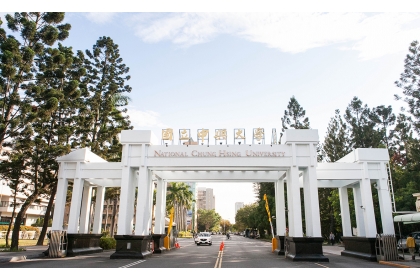Mutual Assistance and Resource Sharing in Higher Education: NCHU Provides Post-Disaster Educational & Research Support to National Dong Hwa University
2024-05-13
興新聞張貼者
Unit秘書室
1,781
Twenty-five years ago, during the 921 earthquake, several buildings, including the library of National Chung Hsing University (NCHU), suffered severe damage. After years of reconstruction, the educational and research environment gradually recovered. On April 3rd this year, a fire caused severe damage to Building One in the College of Science and Engineering at National Dong Hwa University (NDHU) during the aftermath of the Hualien earthquake. Chung Hsing University empathized deeply with this situation. Under the leadership of President Fuh-Jyh Jan, assistance plans were devised to provide relevant teaching and research resources to NDHU. In addition to inviting faculty and students from Dong Hwa University to visit Chung Hsing University for research purposes and ongoing experiments, NCHU also provided accommodation and granted access to core instruments with charging privileges equivalent to those of the host university. Furthermore, in May, the College of Science at NCHU and the College of Science and Engineering at NDHU signed an academic cooperation agreement, facilitating substantial exchange in teaching and research and laying the foundation for long-term collaboration in the future.
Jenn-Ming Song, the Dean of Research and Development at Chung Hsing University, expressed deep empathy for Dong Hwa University’s challenging journey of repair and reconstruction after the earthquake, drawing from Chung Hsing University’s own experiences of overcoming similar obstacles in the past. In addition to expressing concern from the outset, the university made a decision through its management meetings to share research resources and actively provide assistance through practical actions. Chia-Chien Huang, the Dean of the College of Science at Chung Hsing University, stated that they will actively coordinate and facilitate relevant faculty members to provide necessary experimental equipment and teaching resources, with the hope that faculty and students at Dong Hwa University's College of Science and Engineering can swiftly recover their research capabilities and resume normal teaching activities.
Chung Hsing University has proposed assistance measures including:
1. Providing dormitories for Dong Hwa University faculty and students to conduct off-site research and experiments.
2. Facilitating laboratory collaboration within the framework of the cooperation agreement, allowing for joint supervision of students.
3. Opening access to valuable equipment at Chung Hsing University, with charging and usage privileges equivalent to those of the university's own faculty and students.
President Hui-Mi Hsu of National Dong Hwa University expressed gratitude for Chung Hsing University's support. Given the complexity of post-disaster reconstruction efforts compounded by ongoing aftershocks, the assistance provided by Chung Hsing University is akin to a timely rain. Professor Chu-Hsuan Lin, Dean of Research and Development, stated that the support plan for valuable instruments is greatly helpful to Dong Hwa University whose instruments were damaged and unable to operate normally due to the earthquake and fire. Professor Wu-Yuin Hwang, on behalf of the faculty and students of the College of Science and Engineering, extended gratitude. Chung Hsing University's lending hand in this critical moment demonstrates true compassion in adversity.
In the coming period, the two universities will closely collaborate, striving to ensure uninterrupted teaching and research activities for faculty and students despite damage to laboratories and equipment. They also aim to leverage this foundation of goodwill and progress after the post-disaster reconstruction phase, highlighting the comprehensive benefits of sharing higher education resources and fostering collective prosperity and well-being.
Jenn-Ming Song, the Dean of Research and Development at Chung Hsing University, expressed deep empathy for Dong Hwa University’s challenging journey of repair and reconstruction after the earthquake, drawing from Chung Hsing University’s own experiences of overcoming similar obstacles in the past. In addition to expressing concern from the outset, the university made a decision through its management meetings to share research resources and actively provide assistance through practical actions. Chia-Chien Huang, the Dean of the College of Science at Chung Hsing University, stated that they will actively coordinate and facilitate relevant faculty members to provide necessary experimental equipment and teaching resources, with the hope that faculty and students at Dong Hwa University's College of Science and Engineering can swiftly recover their research capabilities and resume normal teaching activities.
Chung Hsing University has proposed assistance measures including:
1. Providing dormitories for Dong Hwa University faculty and students to conduct off-site research and experiments.
2. Facilitating laboratory collaboration within the framework of the cooperation agreement, allowing for joint supervision of students.
3. Opening access to valuable equipment at Chung Hsing University, with charging and usage privileges equivalent to those of the university's own faculty and students.
President Hui-Mi Hsu of National Dong Hwa University expressed gratitude for Chung Hsing University's support. Given the complexity of post-disaster reconstruction efforts compounded by ongoing aftershocks, the assistance provided by Chung Hsing University is akin to a timely rain. Professor Chu-Hsuan Lin, Dean of Research and Development, stated that the support plan for valuable instruments is greatly helpful to Dong Hwa University whose instruments were damaged and unable to operate normally due to the earthquake and fire. Professor Wu-Yuin Hwang, on behalf of the faculty and students of the College of Science and Engineering, extended gratitude. Chung Hsing University's lending hand in this critical moment demonstrates true compassion in adversity.
In the coming period, the two universities will closely collaborate, striving to ensure uninterrupted teaching and research activities for faculty and students despite damage to laboratories and equipment. They also aim to leverage this foundation of goodwill and progress after the post-disaster reconstruction phase, highlighting the comprehensive benefits of sharing higher education resources and fostering collective prosperity and well-being.


